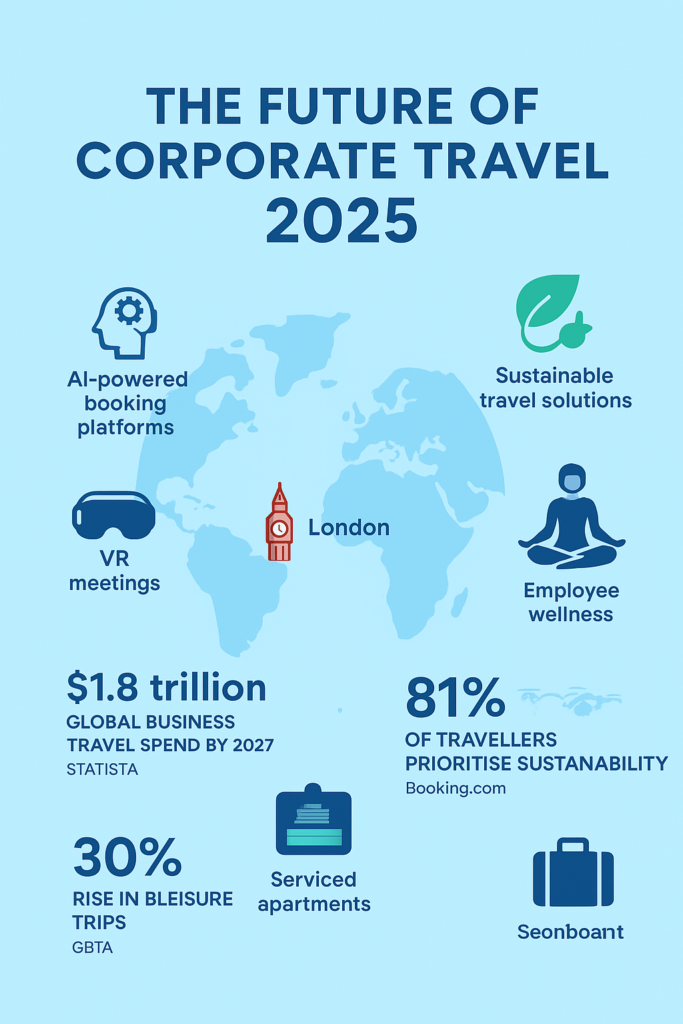Corporate Travel Trends and Innovations to Watch
Corporate travel has always been a cornerstone of international business. Yet, the industry is experiencing unprecedented transformation driven by technology, sustainability, and changing employee expectations. According to the Global Business Travel Association, global business travel spend is projected to reach $1.8 trillion by 2027, with the UK remaining one of Europe’s most important markets. London, a global financial hub, continues to attract executives worldwide, making it an essential city for understanding the future of corporate travel trends.
The State of Corporate Travel in the UK
The UK is Europe’s second-largest business travel market after Germany, with spend expected to surpass £30 billion annually by 2026 (Statista). London, in particular, sees high demand due to its role as a centre for finance, tech, and government. As companies prioritise cost efficiency and employee wellbeing, new trends are reshaping how professionals travel for work. Serviced apartments, such as Liverpool Street Serviced Apartments, have gained popularity as they provide flexibility, cost control, and comfort compared to hotels.
1. Technology and AI-Driven Travel Management
Artificial Intelligence is revolutionising travel booking and expense management. Tools like SAP Concur and TravelPerk allow businesses to automate approvals, enforce policies, and secure better rates. According to a Deloitte report, AI reduces travel programme costs by 15–20% annually.
In London, business travellers staying at Aldgate Serviced Apartments benefit from quick links to corporate hubs in Canary Wharf and The City, reducing reliance on inefficient travel. AI can also analyse employee preferences, ensuring a balance between compliance and comfort.
2. Sustainable Corporate Travel
Sustainability has moved from trend to necessity. With 81% of travellers prioritising eco-friendly options (Booking.com Sustainable Travel Report), companies are rethinking flights, accommodation, and ground transport. Many UK firms now use carbon offsetting programmes and promote rail over air for domestic trips. Eurostar, for example, emits 90% less CO2 than short-haul flights between London and Paris.
For accommodation, serviced apartments like Notting Hill Serviced Apartments often outperform hotels in sustainability by offering longer stays, less laundry turnover, and reduced single-use plastics. Corporate travel policies now frequently highlight sustainable housing choices as a compliance requirement.
3. Virtual and Hybrid Meetings
The pandemic normalised virtual meetings, and hybrid business models are here to stay. Research from McKinsey shows that 30% of travel once deemed essential may never return, as companies replace it with virtual options. However, in-person meetings still carry unique value, particularly in London’s financial and legal sectors.
Companies now combine strategic in-person meetings with virtual alternatives. For example, executives may book extended stays at Fitzrovia Serviced Apartments for quarterly gatherings while relying on VR and video conferencing in between. This hybrid model balances cost, sustainability, and relationship-building.
4. The Rise of Bleisure Travel
Bleisure, the blend of business and leisure, is a rapidly growing phenomenon. According to Expedia Group, 60% of business travellers now extend trips for leisure purposes. London is particularly attractive for bleisure, offering everything from Hyde Park strolls to West End theatre shows.
Serviced apartments like Tower Bridge Serviced Apartments are ideal for bleisure travellers, located close to both corporate hubs and cultural landmarks. Employees gain the benefit of home-like living spaces, making it easier to integrate work and play.
5. Employee Wellbeing and Duty of Care
Duty of care remains a legal and ethical priority for UK employers. A PwC survey revealed that 72% of UK firms consider traveller wellbeing a top concern. Businesses are investing in travel safety tools like International SOS and providing flexible accommodation options that support mental health.
Staying at South London Serviced Apartments, for instance, offers quieter neighbourhoods with access to green spaces, reducing travel stress. Wellness-oriented policies increasingly cover gym access, mental health support, and ergonomic workspace standards.
6. Personalisation Through Data
Corporate travellers expect the same level of personalisation they enjoy in leisure travel. AI and big data now allow companies to tailor trips based on past behaviour. A Skift report highlights that personalised travel experiences boost compliance by 25%.
London properties such as Marylebone Serviced Apartments cater to professionals seeking cultural immersion, with easy access to Oxford Street and the Wallace Collection. By providing customised stays, employers improve both satisfaction and retention.
7. Growth of Long-Term Stays
Remote and hybrid work models have encouraged companies to support longer business trips. Instead of multiple short visits, executives now opt for extended assignments. Data from Airbnb for Work shows a 30% rise in stays over 30 days.
In London, long-term travellers benefit from serviced apartments such as Canary Wharf Serviced Apartments, which feature full kitchens, workspaces, and flexible terms. This model reduces costs and enhances productivity compared to frequent hotel stays.
8. Digital Payment and Expense Automation
Corporate travel expenses are increasingly managed via digital tools. Mastercard and Visa have launched virtual corporate cards, improving security and compliance. Companies adopting digital payment solutions report a 50% drop in processing time (CFO Dive).
By linking stays at centrally located properties like Monument Serviced Apartments to digital expense systems, companies reduce administrative burden and increase transparency.
9. Multimodal Transport and Mobility as a Service (MaaS)
UK business travel is embracing multimodal transport, with seamless connections between rail, underground, rideshare, and cycling. Transport for London has invested heavily in contactless systems and cycling infrastructure. The concept of Mobility as a Service (MaaS) allows integration of multiple modes into one booking platform.
Business travellers staying at West London Serviced Apartments benefit from quick access to Heathrow via the Elizabeth Line. Such innovations cut costs and carbon footprints.
10. The Future Outlook
The future of corporate travel will be shaped by sustainability, technology, and employee-centric policies. For the UK, particularly London, the challenge lies in balancing its role as a global business hub with growing pressure to reduce emissions. Emerging innovations like hydrogen-powered aviation and AI-driven personal assistants will define the next decade.
Companies that adapt now will enjoy lower costs, stronger compliance, and happier employees. For those planning regular trips to the UK, serviced apartments from Urban Stay provide the ideal base, combining comfort, location, and cost efficiency.
Final Thoughts
Corporate travel is evolving faster than ever, with the UK at the heart of these changes. From AI-driven booking tools to sustainable accommodation choices, businesses must remain agile. For executives visiting London, properties like Liverpool Street, Aldgate, and Tower Bridge offer unmatched convenience and flexibility.
By embracing these trends, companies can future-proof their travel strategies and ensure that every business journey adds real value.
































